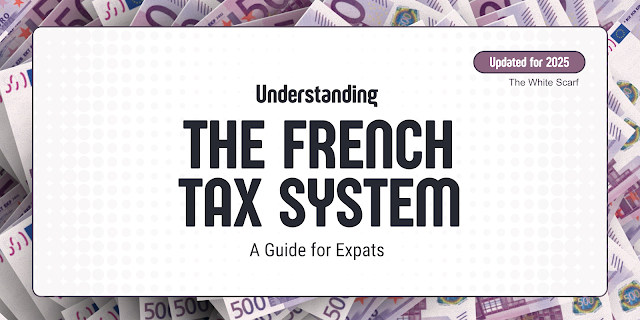Understanding the French Tax System: A Guide for Expats (Updated for 2025)
Introduction
France's tax system is renowned for its complexity, and recent reforms have introduced significant changes. As an expat, staying informed about these updates is crucial to ensure compliance and optimize your tax situation. This guide provides an overview of the key aspects of the French tax system as of 2025, including income, property, and inheritance taxes, along with practical tips for navigating the system.
1. Income Tax in France
France employs a progressive income tax system, where tax rates increase with income levels. The 2025 tax brackets have been adjusted to account for inflation, with a 2% increase in the income limits. The updated brackets are as follows:
| Income Bracket (per share) | Tax Rate |
|---|---|
| Up to €11,520 | 0% |
| €11,521 to €29,373 | 11% |
| €29,374 to €83,988 | 30% |
| €83,989 to €180,648 | 41% |
| Over €180,648 | 45% |
Additionally, a temporary exceptional contribution has been introduced for high-income earners. Individuals with a taxable income exceeding €250,000 and couples over €500,000 will face a minimum tax rate of 20% on their taxable income for the years 2024 to 2026.
Tips for Expats:
- Review Tax Residency Status: Your tax obligations in France depend on your residency status. If you spend more than 183 days in France or have your primary home there, you are considered a tax resident.
- Consult Tax Professionals: Given the complexities of the French tax system and recent changes, consulting with a tax advisor experienced in expat taxation is advisable.
2. Property Tax in France
Owning property in France entails several taxes:
- Taxe Foncière: An annual property tax based on the ownership of land and buildings. The amount varies depending on the property's location and value.
- Taxe d'Habitation: Previously applicable to both owners and renters, this tax has been phased out for primary residences as of 2023. However, it may still apply to second homes.
- Capital Gains Tax: Selling property can incur capital gains tax on the profit made. Exemptions exist for primary residences, but second homes or investment properties are subject to taxation.
Tips for Expats:
- Understand Tax on Second Homes: If you own a second home in France, be prepared for property taxes like the Taxe d'Habitation, which can still apply to non-primary residences.
- Plan for Capital Gains: If you plan on selling property, consider how long you’ve owned it, as the longer you own the property, the greater the potential for tax exemptions.
3. Inheritance Tax in France
Inheritance tax in France can be significant, especially for non-residents. The tax rates vary depending on the relationship between the deceased and the heir. For example, direct descendants (children, parents) have a more favorable tax rate, starting at 5% for the first €8,072 of the estate. For more distant relatives or non-relatives, the tax rate can be as high as 60%.
Tips for Expats:
- Estate Planning: If you have significant assets in France, it’s a good idea to plan ahead and seek advice on French inheritance law. France has strict rules regarding inheritance, especially if you have children, and these rules may differ from those in your home country.
- Consider Gifts While Alive: You can make gifts during your lifetime to reduce the taxable estate, and there are exemptions that allow you to give money to children or grandchildren tax-free, up to a certain limit.
Navigating the French Tax System: Helpful Tips for Expats
- Stay Informed: Tax laws can change, and staying updated is essential. Regularly consult official French government resources or reputable tax advisory services.
- Maintain Comprehensive Records: Keep detailed records of all financial transactions, property documents, and any correspondence with tax authorities. This will be invaluable in case of audits or disputes.
- Understand Tax Treaties: France has agreements with many countries to avoid double taxation. Familiarize yourself with these treaties to understand how they affect your tax obligations.
Final Thoughts
While France's tax system may seem complex, understanding the different types of taxes and your responsibilities as an expat can make the process much easier. Whether you’re dealing with income tax, property taxes, or inheritance issues, it’s crucial to stay informed, plan ahead, and seek professional help if needed. By doing so, you can ensure compliance with the system while also maximizing the tax benefits available to you as an expat living in this beautiful country.

